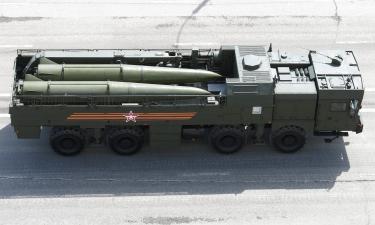Egyptian man charged with spying for Israel claims he passed the outdated documents
An Egyptian man charged with spying for Israel stunned the court by praising Israel for its advanced technology and claiming the documents he passed on were so outdated they posed no threat to Egyptian security.

Mohammed Sayed Saber, 35, a nuclear engineer with Egypt's atomic agency, has been charged with stealing secret documents and giving them to Mossad, the Israeli intelligence agency, in exchange for US$17,000 (EUR12,500) and with the aim to harm Egyptian national security, the prosecutor said.
An upbeat Saber appeared before the judge in a white prison jumpsuit at the start of his trial Tuesday, smiling and flashing a victory sign to media crammed into a dusty Cairo courtroom.
"I don't hide my admiration of Israel ... It has reached a very high technological and scientific level," Saber said in court. "To seek to benefit from Israel scientific expertise, is not shameful or wrong ... They are a very organized and pragmatic society with definite goals, unlike chaotic societies."
"I don't have animosity toward the Israeli people, why should I? The fact that we had wars against Israel doesn't mean that we remain enemies forever," added Saber, who has never visited the Jewish state.
Saber's pro-Israeli speech was so unusual that Judge Mohammed Reda Shwakat, presiding over the three-judge panel at south Cairo state security court, called him from the defendant's cage to the bench where he then questioned him for almost four hours in the presence of three defense lawyers.
The hearings were adjourned till June 9. Saber, who faces up to 25 years in jail on espionage charges, did not enter a plea Tuesday.
According to the Egyptian state security prosecutor, one Japanese and one Irish national are also wanted in the case and are being tried in absentia. Saber was arrested Feb. 18 after he returned to Egypt from Hong Kong, were the prosecution said he used to meet with agents working for Israel.
Israel has dismissed allegations of Saber working for Mossad. In April, Israeli Foreign Ministry Spokesman Mark Regev said such "charges unfortunately appear all too often in Egyptian media and they always prove to be baseless."
Saber's mother and wife were present in court but refused to talk to the media. His mother kissed him, wiped his sweat from his face before breaking into tears when she was allowed to join him in the defendants' cage during a break. His wife handed him biscuits and soft drink. Saber is a father of two girls.
Saber said that he was contacted by what he thought was a Japanese multinational firm to which he gave "old and invaluable documents that don't present danger to Egyptian national interests."
But later, after growing suspicious of the firm, Saber informed the Egyptian Embassy in Riyadh, Saudi Arabia, where he was been working while on sabbatical from the atomic agency since 2000, about his actions.
In 1999, Saber allegedly asked the Israeli embassy in Cairo for a grant to pursue his PH.D. in nuclear science, but was told by Egyptian intelligence not to go to the embassy again.
"I was hoping to take the chance I deserve like everybody else, as I was subjected to oppression and suppression (at work)," Saber said in court. "I'm not looking for a villa, car or money, but I have a scientific mind, I wanted to develop that and change the face of history."
"I'm innocent, I didn't do anything that would harm my country, God knows that," he told media from behind bars during a break.
One of Saber's defense lawyers, Adel Aziz, said he believed in his client's innocence as he had alerted the Egyptian authorities about his actions. The defense team asked that a committee be set up to review the relevance and value of the documents Saber passed on.
Egypt was the first Arab country to sign peace treaty with Israel in 1979, but relations have always remained cool at best, and normalization is frowned upon. Egypt has announced several spying cases since then, latest of which an Egyptian-Canadian man was convicted to 15 years for espionage for Israel last month.
Subscribe to Pravda.Ru Telegram channel, Facebook, RSS!





